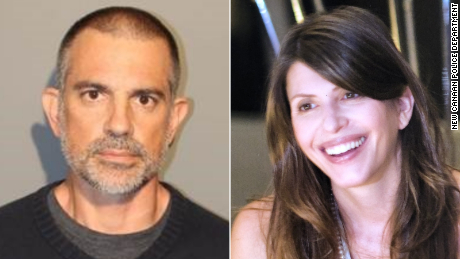To do that, Dulos' attorney, Norm Pattis, has asked the state to proceed with the criminal case against a defendant who is no longer alive. Whether a posthumous trial will take place remains to be seen, but legal experts told CNN that such a proceeding is extremely rare. "It is completely unprecedented in my experience for the case to proceed where the defendant has died," said Todd Fernow, a law professor and director of the Criminal Law Clinic at the University of Connecticut. "But I also don't know of any ruling that says its prohibited." Last month, Dulos pleaded not guilty to the murder of his wife. But with his death, the future of the case is up in the air, and along with it, whether the public will ever learn the fate of Jennifer Farber Dulos. Here's where the case stands, and what could happen next.
'Tried and convicted in the court of public opinion'
 Dulos and Farber Dulos, a 50-year-old mother of five, were in the midst of a bitter divorce and custody battle when she vanished in May 2019. One week later, Dulos and his then-girlfriend Michelle Troconis were charged with tampering with or fabricating evidence. They pleaded not guilty.Dulos was charged with murder and kidnapping last month. He was out on $6 million bond when he failed to appear for an emergency bond hearing Tuesday. The bond hearing was set after one of the properties used to secure his bond was found to be in foreclosure and didn't meet the bond requirement set by the court. Authorities went to his home in Farmington, Connecticut, and found Dulos in "dire" condition, his attorney said. He was eventually taken to a New York hospital, where he died Thursday. Pattis insisted Dulos' death did not reflect "a consciousness of guilt," but instead "a conscience overborne with the weight of a world that was too busy to listen and that wanted a story more than it wanted the truth." Dulos deserves his day in court, Pattis said, because he "was tried and convicted in the court of public opinion.""Now," he said, "he has been executed."
Dulos and Farber Dulos, a 50-year-old mother of five, were in the midst of a bitter divorce and custody battle when she vanished in May 2019. One week later, Dulos and his then-girlfriend Michelle Troconis were charged with tampering with or fabricating evidence. They pleaded not guilty.Dulos was charged with murder and kidnapping last month. He was out on $6 million bond when he failed to appear for an emergency bond hearing Tuesday. The bond hearing was set after one of the properties used to secure his bond was found to be in foreclosure and didn't meet the bond requirement set by the court. Authorities went to his home in Farmington, Connecticut, and found Dulos in "dire" condition, his attorney said. He was eventually taken to a New York hospital, where he died Thursday. Pattis insisted Dulos' death did not reflect "a consciousness of guilt," but instead "a conscience overborne with the weight of a world that was too busy to listen and that wanted a story more than it wanted the truth." Dulos deserves his day in court, Pattis said, because he "was tried and convicted in the court of public opinion.""Now," he said, "he has been executed."
Judge could consider cost, justice, and lack of jail time
When a defendant dies before a case goes to trial, prosecutors ordinarily file what's called a nolle prosequi, or a notice not to seek prosecution, and a judge could either dismiss the case or the charges would be dismissed after 13 months."Generally, … the trial's over, there is no trial, there is no case, the charges get dismissed. You don't prosecute dead people," said Joey Jackson, a criminal defense attorney and CNN legal analyst. "It's over."Pattis filed a motion seeking to prevent that, asking the court to substitute Dulos' estate as the defendant in the criminal case. Dulos' attorneys wrote in the motion that after his suicide attempt, authorities found a note Dulos wrote. According to a copy of the note obtained by CNN, Dulos said the case against him was "fabricated by law enforcement" and claimed his attorney could explain part of the evidence against him.But there are other factors the court could weigh in deciding to allow a case against Dulos to proceed. One issue, Fernow said, is a dead defendant can't go to jail if he's found guilty, nor could his estate. And if Dulos can't be punished, the court could have trouble finding an interest in going forward."From (the state's) standpoint, 'If we win, we don't win anything,'" Fernow said. Another factor is the potential cost the trial would present to the state. And this case, Fernow said, could be very costly, he said, pointing to "just the sheer volume of evidence, the minutiae that have been collected" by investigators and be introduced in court."I can tell you this case is going to be a very expensive case for the state to try," he said, later adding, "We're talking in the millions of dollars." But another thing to consider is the family, Jackson said.The couple had five children who have lived with Jennifer Dulos' mother since her disappearance. The family, he said, "certainly deserves to know what happened to their loved one, and I think that should weigh heavily."
One issue, Fernow said, is a dead defendant can't go to jail if he's found guilty, nor could his estate. And if Dulos can't be punished, the court could have trouble finding an interest in going forward."From (the state's) standpoint, 'If we win, we don't win anything,'" Fernow said. Another factor is the potential cost the trial would present to the state. And this case, Fernow said, could be very costly, he said, pointing to "just the sheer volume of evidence, the minutiae that have been collected" by investigators and be introduced in court."I can tell you this case is going to be a very expensive case for the state to try," he said, later adding, "We're talking in the millions of dollars." But another thing to consider is the family, Jackson said.The couple had five children who have lived with Jennifer Dulos' mother since her disappearance. The family, he said, "certainly deserves to know what happened to their loved one, and I think that should weigh heavily."
What happens to 2 other suspects
A posthumous trial "doesn't happen," Jackson said. But he believes Pattis could have a case to make, because of Troconis and Kent Mawhinney, Dulos' former attorney. Both face charges of conspiracy to commit murder related to the case. They have not entered pleas. In the note Dulos left, he wrote that neither Troconis nor Mawhinney had anything to do with his wife's disappearance.According to Jackson, Pattis could argue it wouldn't burden the state to hold a trial for Dulos if prosecutors intend to proceed with trials against Troconis and Mawhinney."We got the same police officers, we got the same evidence, we got the same factual scenario and circumstances, we've got the same forensic analysis and experts we're going to be putting on," Jackson said. "It doesn't seem to present a hardship for judicial resources or witnesses or monetarily present a burden to the statRead More – Source
[contf] [contfnew] 
cnn
[contfnewc] [contfnewc]





